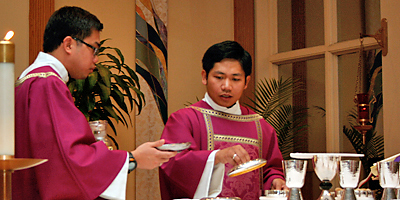
 The Diocese of Charleston has 35 priests serving here from other countries.
The Diocese of Charleston has 35 priests serving here from other countries.
That may sound like a lot, but it’s fairly compatible with other dioceses in the United States, where one in six Catholic priests come from abroad, and 300 new international priests arrive yearly.
In South Carolina, most of the foreign priests come from Nigeria, Colombia and India. These men attribute the rise and fall of vocations to our different societal influences.
Father Emmanuel Efiong is administrator of Holy Cross Church in Pickens and St. Luke Mission in Easley. He said in his home country of Nigeria, he was encouraged by his parents and motivated by the missionary priests from Ireland.
“They were so loved and helpful to the people,” Father Efiong said. “I wanted to be like that holy man.”
Another large factor is the establishment of minor seminaries where children receive their education starting at age 11. They advance through grade school, high school and college in a seminary environment, and while some move on to other careers, others progress naturally to theology and religious life.
The mood of raising priests is very different, and very difficult, in the United States, he said, adding that it is much more secular with many distractions.
Since 1975, the number of priests has declined more than 30 percent even though the Catholic population overall has grown, according to the Center for Applied Research in the Apostolate.
Though international priests fill a gap, they are only on loan from their home dioceses or religious congregations, where they are also in great demand. Typically, they receive a religious work visa for three to five years, and can then be recalled by their bishop or assigned elsewhere.
Father Efiong has been a priest for almost 22 years and has served in the diocese about two.
Father Filemon Juya also came on a religious visa and has been here almost 15 years now, he said.
The priest said he believes one reason poorer countries are producing more vocations is simply because their world is so different, and material wealth and possessions are not a factor for most.
Father Juya said in Colombia, sacrifice is a way of life, and when children think of their future, they think of ways they can be of service in their community.
Both priests said that in order to increase vocations in the U.S., there must be a change in outlook.
Father Juya said parents and religious must teach Christian values over material values, and instill the importance of giving to others.
